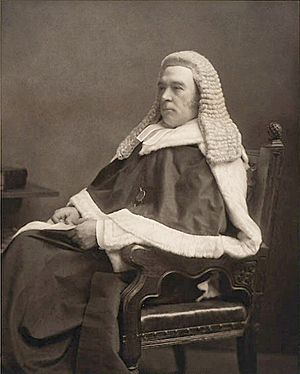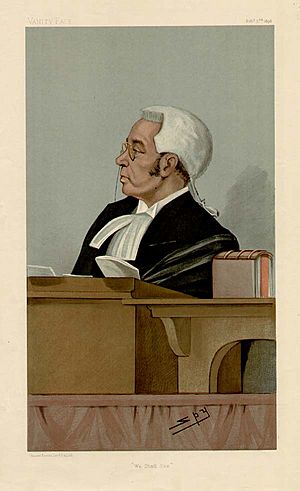John Bigham, 1st Viscount Mersey facts for kids
Quick facts for kids
The Viscount Mersey
|
|
|---|---|

Lord Mersey
|
|
| President of a High Court Division | |
| In office 10 February 1909 – 4 March 1910 |
|
| Preceded by | Sir Gorell Barnes |
| Succeeded by | Sir Samuel Evans |
| Justice of the High Court | |
| In office 1897 – 10 February 1909 |
|
| Member of Parliament for Liverpool Exchange | |
| In office 7 August 1895 – 10 November 1897 |
|
| Preceded by | Ralph Neville |
| Succeeded by | Charles McArthur |
| Personal details | |
| Born | 3 August 1840 Liverpool |
| Died | 3 September 1929 (aged 89) Littlehampton, Sussex |
John Charles Bigham, 1st Viscount Mersey (born August 3, 1840 – died September 3, 1929) was an important British judge and politician. He started his career as a very successful lawyer. Later, he became a judge, focusing on business law.
After he retired, Lord Mersey stayed active in public life. He is most famous for leading official investigations into the sinking of large ships. These included the famous RMS Titanic, the RMS Lusitania, and the RMS Empress of Ireland.
Contents
Early Life and Education
John Charles Bigham was born in Liverpool in 1840. He was the second son of John Bigham, a wealthy merchant, and his wife, Helen.
He went to school at the Liverpool Institute High School for Boys. After that, he studied law at the University of London. Even though he didn't finish his degree there, he continued his studies in Berlin and Paris.
In 1870, he became a barrister, which is a type of lawyer, at the Middle Temple in London. He worked as a commercial lawyer, mostly in his hometown of Liverpool. In 1871, he married Georgina Sarah Rogers, who was also from Liverpool. Their first son, Charles Clive Bigham, was born in 1872.
Becoming a Lawyer and Judge
In 1883, John Bigham was named a Queen's Counsel. This is a special title given to experienced lawyers. His work as a commercial lawyer became very successful.
He tried to enter politics several times. In 1885 and 1892, he ran for Parliament in Liverpool but lost. Finally, in 1895, he was elected as a Member of Parliament for the Exchange area of Liverpool. He was part of the Liberal Unionist party.
However, he was more interested in his legal work than in politics. He was so good at his job that he became one of the richest lawyers of his time.
In 1897, Bigham was appointed a judge in the King's Bench Division. This meant he had to leave his role as a Member of Parliament. He continued to work on business law cases. He was also given the title of Sir that same year.
He also led the Railway and Canal Commission, which dealt with issues related to railways and canals. He reviewed military court decisions from the Second Boer War. In 1909, he became the President of a special court division that handled family and shipping cases. He retired from this role in 1910. That same year, he was given the title of Baron Mersey.
Investigating Famous Shipwrecks
Lord Mersey became very well-known in 1912. He was chosen to lead the official investigation into the sinking of the RMS Titanic. This was a huge and important inquiry.
Some people had concerns about how he handled the investigation. They felt he might have favored the shipping companies. However, the inquiry's findings were generally seen as fair.
In 1913, Lord Mersey also led a big meeting called the International Convention for the Safety of Life at Sea. This meeting created new rules to make sea travel safer.
He then led three more important investigations into ship sinkings:
- The RMS Empress of Ireland in 1914 (this inquiry took place in Canada).
- The Falaba in 1915.
- The RMS Lusitania in 1915.
The investigation into the Lusitania sinking concluded that Germany was responsible for the tragedy. This finding was helpful for the British government at the time. In 1916, Lord Mersey was given an even higher title, becoming a viscount.
Later Years
In his later life, Lord Mersey had trouble hearing. But he continued to work actively. Even in his eighties, he returned to work as a judge to help clear a large number of cases. He was very efficient and helped solve many cases quickly.
His wife passed away in 1925. Lord Mersey died four years later in Littlehampton, Sussex, at the age of 89.
His third son, Sir Trevor Bigham, became a high-ranking police officer in London. His first son, Charles Clive Bigham, survived the sinking of another passenger ship, the SS Persia, in 1915.
 | Sharif Bey |
 | Hale Woodruff |
 | Richmond Barthé |
 | Purvis Young |


